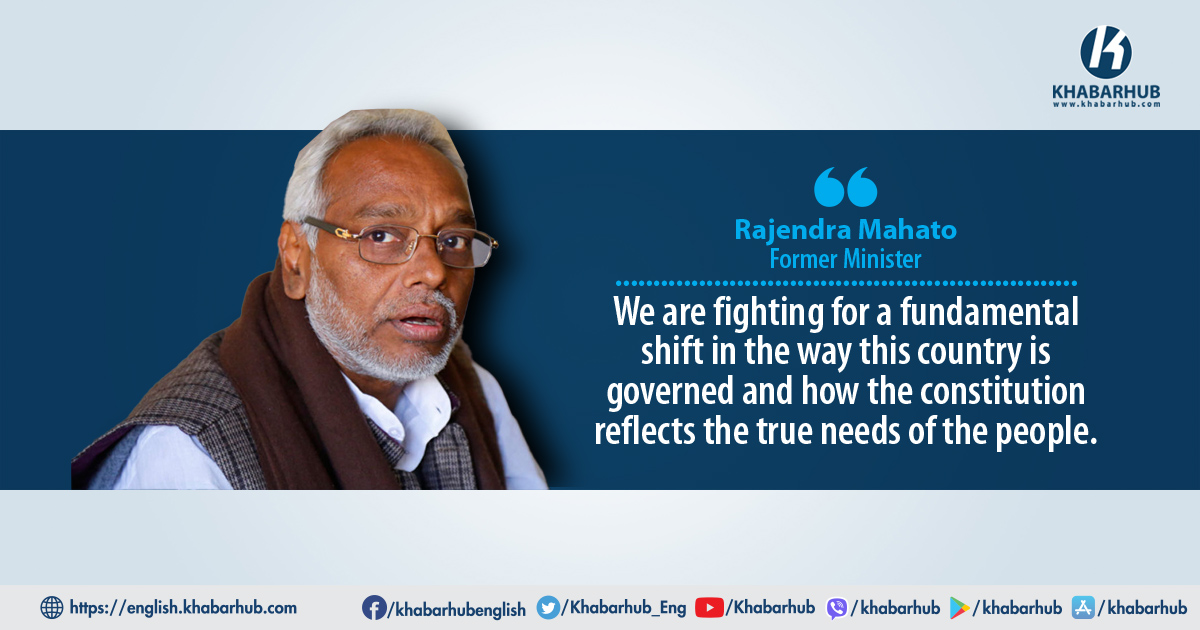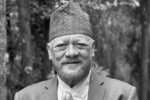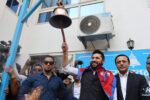KATHMANDU: Rajendra Mahato, who was once a minister in various ruling coalitions, now positions himself as a “self-proclaimed soft rebel” against the powers that be.
A graduate in humanities and a postgraduate in law, Mahato has consistently expressed dissatisfaction with the country’s Constitution.
Once known for his strong stance against communities outside the Terai-Madhesh region, Mahato is now forming an organization called the National Liberation Campaign, which he believes will unite all oppressed regions of the country.
In his quest to become the leader of a national party, Mahato is seeking support from figures within the Newar community in Kathmandu and from parts of the Limbu community-based identity front.
Mahato’s political journey began in 2046 BS with the Nepal Sadbhavana Party. He won a seat from Sarlahi-4 in the first Constituent Assembly election of 2068 BS.
He later secured a victory from Dhanusha-3 in the 2074 BS House of Representatives elections, and has been a consistent candidate in every parliamentary election since 2048 BS.
Over the years, Mahato has served as a minister four times, including a brief tenure as deputy prime minister.
He held the position for just 20 days in the expanded Council of Ministers under then-Prime Minister KP Sharma Oli, who had dissolved the House of Representatives and declared an interim status.
Mahato lost his deputy prime ministerial position in 2078 BS, following a Supreme Court ruling while he was en route to Sindhupalchowk in a helicopter.
After losing to Mahindra Raye Yadav, Chair of the Nepal Samajwadi Party, in the 2079 BS House of Representatives election from Sarlahi-2, Mahato’s ambitions to return to parliament and government seemed to hit a setback.
Following the weakening of the former Loktantrik Samajwadi Party after the election, party Chair Mahanta Thakur left in dissatisfaction with the nomination of Mahato as senior vice-president and the party leadership.
Since the announcement of his “National Liberation Revolution” campaign, Mahato has remained relatively quiet in the public sphere.
However, the Election Commission officially renamed his party to Rastriya Mukti Party Nepal.
In discussions, Mahato has claimed that in nearly 19 years of the Federal Democratic Republic—established by the citizens—the country has experienced little more than statelessness.
He argues that the legacy of colonialism still lingers in Nepal today.
Below is an edited excerpt from Krishna Timalsina’s conversation with Mahato, in which he elaborates on his dissatisfaction with the constitution, his recent political campaigns, and his views on contemporary politics:
With the formation of the Rashtriya Mukti Party Nepal, your politics now extends beyond just campaigns. You’re now saying that a single national state is an obstacle to prosperity, and advocating for a multi-national state. What exactly is the obstacle?
Our party, formed for the National Liberation Revolution, will proceed in three stages: knowledge, struggle, and rebellion.
In the early phase, we focus on educating the people and raising awareness. The second phase involves a struggle, and the third phase is the rebellion itself.
These three processes—knowledge, struggle, and rebellion—are interlinked and will continue until we reach our goal.
The obstacle lies in the fact that a single national state has failed to provide the rights and identity necessary for prosperity.
This is why we need the agenda of a pluralistic state. It’s not a new idea. Over the course of 270 years since the creation of Nepal, various political and social arrangements have been made in different periods.
Currently, we are in a democratic and republican situation. We have lived in democracy and a republic for 35 years.
During this time, we have enacted seven different constitutions. Despite these changes, the people still feel that their rights and identities have not been recognized. This is the ongoing struggle.
The country, instead of progressing towards prosperity, has been sinking into poverty. Our youth are forced to leave the country to survive.
There must be a reason for this! Why is the country in such a state? The answer lies in politics.
It is politics that has denied citizens their rights, failed to deliver good governance, and led the country into poverty.
If politics is not conducted in the right way, the results will never be positive. This is exactly what has happened in Nepal.
The country has existed for 270 years, and for 104 of those years, we endured the Rana rule. What good came of that?
And what’s the point of attacking the monarchy now? For the past 35 years, we’ve been governed by those who believe in multi-party democracy, republicanism, and democracy itself.
And yet, prosperity has not been achieved. The people have become frustrated and angry over time. Now, this anger and frustration must be addressed and eradicated.
You may also have a stake in causing this situation!
In the past 35 years, we have been involved in politics, and we too are responsible for the current state of affairs.
We must focus on the ideas behind the politics, not just the individuals involved. Politics and governance must be rooted in ideas, and there is an error in the very ideas that have shaped them. This is what we need to understand.
Do you blame the system or the Constitution?
I do blame the Constitution, but it’s important to recognize that the Constitution is a product of the ideas behind it.
After the interim constitution was enacted, you led a revolt, pushed for the first amendment, and said, “This country needs federalism.”
Elections were held under the banner of federalism, and after the new constitution was issued, you and your party completed the process by assuming power. Why didn’t you raise concerns at that time? Now that Rajendra Mahato has lost the election, what do you have to say?
The constitution created by the Constituent Assembly in 2072 BS was imposed on the people in the name of hope, under the pretext of a two-thirds majority.
The people for whom the constitution was made—was it not enacted after shooting at the same people? Nepal is the only country in the world that has created seven constitutions in 70 years.
Such a constitution will be created, but what kind of constitution does it become when the country and its people do not receive recognition or rights? The reality is that the constitution is always created by the rulers for their own benefit.
First, we need to ask ourselves whether the country is governed according to the foundation on which this nation was built.
Prithvi Narayan Shah unified Nepal 270 years ago. There may have been disputes or mistakes during the unification process, but Nepal was created.
We achieved Nepali self-respect and identity. Nepal was formed only after all these identities were integrated.
Even before Nepal was officially unified, there was already an identity here. Nepal is made up of multiple languages, castes, and nationalities.
Nepal was not formed from a single identity. This is why Prithvi Narayan Shah said, “This country is a common flower garden of four varnas and thirty-six castes.”
But unfortunately, the rulers here lacked the awareness to create a constitution based on the values of majority national politics or to manage the country’s governance properly.
The Rana regime ruled alone for 104 years, but it was not the same ruler throughout that period.
A single person ruled under a feudal system. This is not what Rajendra Mahato says, but what history tells us.
What did your political generation do after the political change of 2046 BS and the creation of modern Nepal?
Even in the multi-party system that came with the 2046 BS political change, we still saw a single government ruling the country.
The tendencies of Brahmanism persisted even within the multi-party framework! I am speaking about these tendencies, not about any particular caste, community, or individual. I am speaking about the ideas behind them.
In this country, the constitution was created from a single idea. Even after 2047 BS, the same mindset persisted.
The same tendencies were carried forward when the 2072 constitution was created.
In this country, indigenous communities, ethnic groups, and Madheshis fought for their rights. However, Oli’s tendency to create a constitution based on a singular vision dominated.
The Nepali Congress, CPN-UML, and Maoist leadership all embraced this single-minded thinking when crafting the 2072 BS constitution.
In a country where political consensus is absent, the actions of that country follow this pattern.
Political consensus should involve reconciling the correct identities and nationalities of the people, and creating a constitution that reflects this.
Nature has blessed us with the potential to move forward, but now the situation has reached a point where young people are forced to leave the country because of poverty.
Those of you who fought for and amended the interim constitution are now questioning the constitution approved by popular consent. The constitution envisions an inclusive system of state power. You are accused of misusing it. Shouldn’t we also review how a political party with an overall national political vision has carried forward the constitution?
The interim constitution of Nepal was almost a political compromise. It was a constitution designed to reflect the meaning and spirit of all previous constitutions.
However, the guideline of the interim constitution was that the final constitution should be created by the Constituent Assembly.
Despite this, the Congress, UML, and Maoists created the final constitution through the Constituent Assembly, which has led us to where we are now.
These three parties received 90 percent of the votes and promised that the Constitution would be a common document for all.
They urged the people to vote in favor of it, assuring them, “We will make the constitution. What kind of constitution can the small parties create?” However, the last three constitutions of Nepal were shaped by four leaders.
The Constituent Assembly voted according to the decisions made by the heads of the UML, Congress, and the Maoists. There is no point in covering this up. When the constitution was being drafted, the interim constitution was directly rejected.
Yet, you held elections based on that same constitution, you assumed power under that same constitution, and you pursued politics under that constitution. Wasn’t your role contradictory regarding the Constitution?
As soon as this constitution was promulgated, the leaders of Congress, UML, and the Maoists went to parliament and promised, “We will amend it according to the demands of the people.”
However, nine years have passed, and no meaningful amendments have been made. We supported the idea of amendments and the progress that would come with them. We even participated in the government.
A constitution is a living document, one that should change according to the needs and demands of the people. If we treat it like the Gita or the Mahabharata, it will not stand the test of time.
Now, the people of this country are disillusioned. The situation has become a scandal. All three party leaders are implicated in this scandal. A scandal breeds more scandal—it doesn’t bring development, prosperity, rights, or identity. Instead, it leads the country into chaos through narrow, single-minded thinking.
Currently, in parliament, the two major political parties, who control almost two-thirds of the seats, have pledged to amend the constitution. Can’t we now go there, offer suggestions, push for reforms, and demand an amendment that better reflects our needs?
It’s been nine years since these three parties created the constitution, and it’s been nine years since they promised to amend it. But instead of working on reforms, they are busy with corruption.
They are busy deceiving the people, looting the country with both hands. Their focus is on maintaining power for themselves, not on serving the country or the people.
The people have always believed in their promises. And every time, they have been betrayed and led to this point. So, enough with the empty talk. We have put forward three key agendas to change this country:
This country should be built for all Nepalis. To achieve this, good governance and a constitution that reflects national politics must be created. The constitution must be revised and amended.
Our civilization and culture must be preserved. Our ancient Vedic civilization is one of the oldest in the world. Capitalism and communism are not new ideologies—they are aging. We must honor and protect our heritage.
Nationalism is missing in this country. Some are labeled imperialists, others are called expansionists, and yet they claim to be great nationalists. True nationalism is about loving your people and your country.
Now, should we center our nation-building efforts around Prithvi Narayan Shah and King Mahendra?
It was King Mahendra who defined the concept of nationalism. When Prithvi Narayan Shah created Nepal, he said, “This is not a Nepal of one caste, it belongs to all.”
We should create a common nation now, just as he envisioned—a nation where all identities are respected. Civilization and culture must be preserved.
This country has become one of the poorest in the world. The Nepali people were not born to live as citizens of a poor nation.
If we had used the gifts nature has given us properly—such as our water resources and tourism potential—Nepal could be one of the most prosperous countries in the world. Our youth would not have to flee in search of a better future.
You are currently running a campaign. What will this movement look like when you say you will revolt in the end?
It is a rebellion of ideas—a peaceful struggle and a rebellion for ideological change. We are not seeking a change of faces or personalities.
We are fighting for a fundamental shift in the way this country is governed and how the constitution reflects the true needs of the people.









Comment